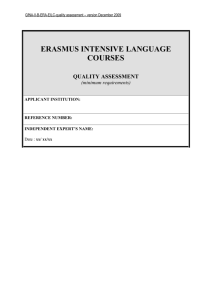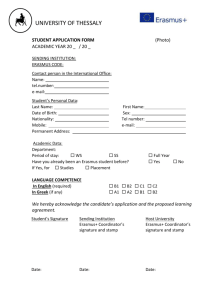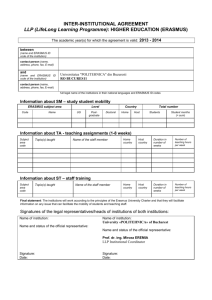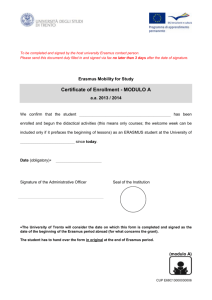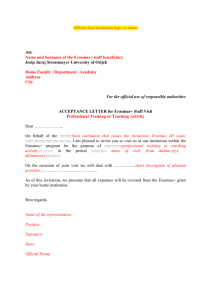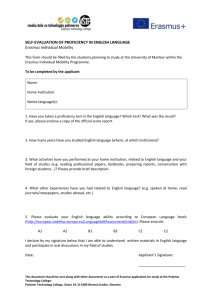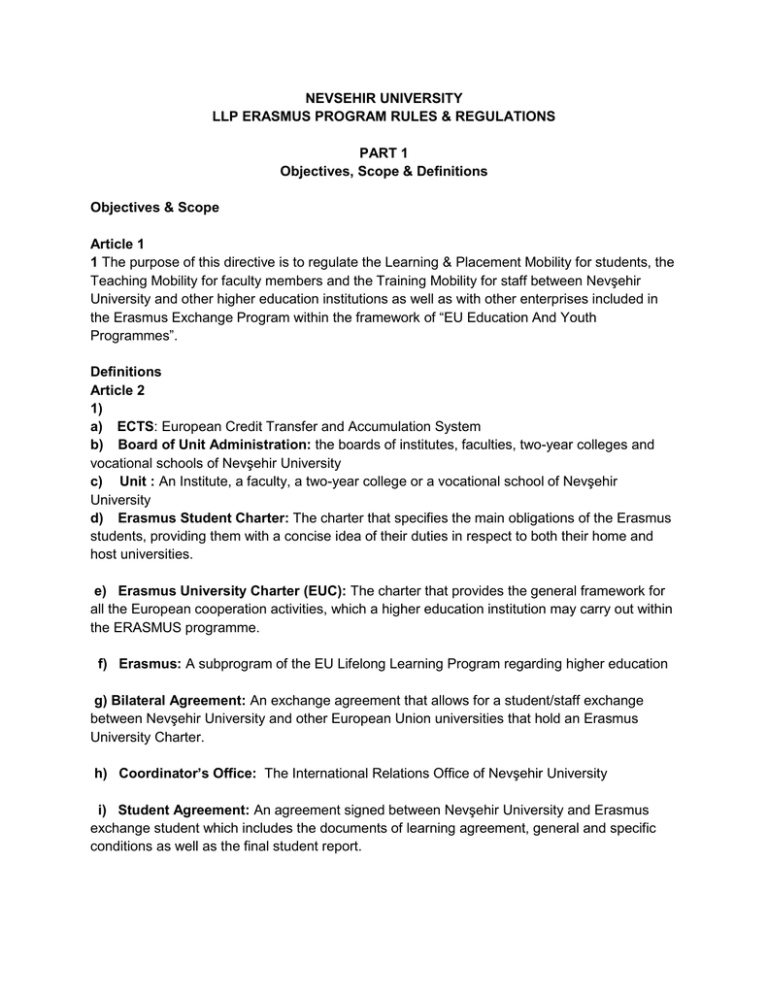
NEVSEHIR UNIVERSITY
LLP ERASMUS PROGRAM RULES & REGULATIONS
PART 1
Objectives, Scope & Definitions
Objectives & Scope
Article 1
1 The purpose of this directive is to regulate the Learning & Placement Mobility for students, the
Teaching Mobility for faculty members and the Training Mobility for staff between Nevşehir
University and other higher education institutions as well as with other enterprises included in
the Erasmus Exchange Program within the framework of “EU Education And Youth
Programmes”.
Definitions
Article 2
1)
a) ECTS: European Credit Transfer and Accumulation System
b) Board of Unit Administration: the boards of institutes, faculties, two-year colleges and
vocational schools of Nevşehir University
c) Unit : An Institute, a faculty, a two-year college or a vocational school of Nevşehir
University
d) Erasmus Student Charter: The charter that specifies the main obligations of the Erasmus
students, providing them with a concise idea of their duties in respect to both their home and
host universities.
e) Erasmus University Charter (EUC): The charter that provides the general framework for
all the European cooperation activities, which a higher education institution may carry out within
the ERASMUS programme.
f) Erasmus: A subprogram of the EU Lifelong Learning Program regarding higher education
g) Bilateral Agreement: An exchange agreement that allows for a student/staff exchange
between Nevşehir University and other European Union universities that hold an Erasmus
University Charter.
h) Coordinator’s Office: The International Relations Office of Nevşehir University
i) Student Agreement: An agreement signed between Nevşehir University and Erasmus
exchange student which includes the documents of learning agreement, general and specific
conditions as well as the final student report.
j) Learning Agreement: The agreement signed between an Erasmus student, Department/
Program Coordinators for Erasmus of both institutions , which provides information about the
host university, the courses to be taken and the credits thereof.
k) Rector: The Rector of Nevşehir University
l) The Senate: The Senate of Nevşehir University
m) Training Agreement: The document signed between the exchange student and the sending
& receiving institutions, which includes a work program as well as papers specifying the
required skills, qualifications, recognition etc.
n) Placement Agreement: The document signed between the sending institution and the
student, which specifies information regarding partners, place, duration, financial support, etc.
o) National Agency: The Office for EU Education And Youth Programmes
p) University: Nevşehir University (NEU)
PART 2
General Principles for Student Exchange
Article 3
1) The University has adopted the principles of the Erasmus University Charter given by the
European Commission and promises to carry out its activities based on these principles.
Article 4
1) It is necessary to have a valid bilateral agreement signed between NEU and higher
education institutions that hold EUC for all exchanges under Erasmus learning mobility program.
It is not required for a university to hold an EUC or a bilateral agreement for placement
mobilities. A letter of intent or a personal placement agreement/convention in which both parties
are involved shall be binding.
Article 5
1) Eligible for exchange grants are those who:
a) are citizens of Turkish Republic
b) are citizens of the EU or the European Economic Area
c) are recognized by Turkey as immigrants, stateless or permanent residence holders.
However, students from non-EU countries who study in Turkish higher education institutions
having equal rights as Turkish students within the framework of particular exchange agreements
cannot be accepted as students with Turkish citizenship under Erasmus agreement.
Article 6
1) NEU shall provide the exchange grant for students who would like to take part in the Erasmus
exchange program within the framework of bilateral learning mobility programs and/or
placement programs under Erasmus between Nevşehir University and a higher education
institution with an Extended Erasmus University Charter.
a) Students who would like to take part in an Erasmus learning mobility program must either be
a full-time student of an undergraduate, a master’s, a Ph.D or a Proficiency in Art student.
These students are provided with a grant and they are required to carry out their academic
activities abroad.
For those who would like to take part in an Erasmus placement program, it is necessary that
they be full-time students of an associate, undergraduate, master’s, Ph.D, Proficiency in Art or
Proficiency in Medicine degree.These students are provided with a grant and they are required
to carry out what they are expected to do in institutions, enterprises, education centers,
research centers and as such abroad.
b) The Coordinator’s Office for Erasmus shall prepare an annual work program and send it to
the relevant offices from where they send the existing bilateral agreements and/or letters of
intent back to the Coordinator’s Office in order to determine the number of students next year.
c) The student applies to the International Relations Office of Nevşehir University with his/her
transcript confirmed by the Registrar’s Office.
d) Prep class students and first years may not take part in Erasmus in their first year. However,
they may submit their applications in their first year in order to take part in Erasmus mobility
program next year. Placement mobility does not apply to this clause. Scientific prep class MA
students may not take part in this mobility.
e) Following are the cases when Erasmus grant shall not be provided:
1) For minor and major programs,
2) Suspension from school or a punishment more grave than that following a disciplinary action
3) in case the learning mobility abroad takes less than 3 months or more than 1 year
4) Students with special student status
5) in case the placement mobility takes less than 2 weeks or more than 12 weeks for associate
degree students, less than 3 months or more than 12 months for bachelor/ master’s/ proficiency
in art degree students.
Article 7
1) Relevant office(s) determined by the International Relations Office of NEU shall prepare the
language proficiency test (oral & written) to assess the four skills (reading, writing, speaking,
listening) of Erasmus candidates.
2) NEU posts on its website the list of higher education institutions that allow for Erasmus
learning and placement mobility. Students can get information about the Erasmus exchange
program from Erasmus coordinators and the website. Moreover, all required information is sent
through written notification to the deans’ offices, institutes, music conservatories, colleges and
vocational schools.
3) The Coordinator’s Office for Erasmus works in collaboration with the Turkish National Agency
in order to determine a weighted scoring system used to assess applications for Erasmus.The
results are announced on the website of NEU and the bulletin boards of the International
Relations Office and the relevant departments are notified thereof.
4) It is necessary that undergraduate and graduate students applying to the program have a
minimum GPA of 2.00 out of 4.00 or 70 points out of 100 and not have lost an academic term or
two due to a failure. On the other hand, it is necessary that MA students have a minimum GPA
of 2.50 out of 4.00 or 75 points out of 100.
5) A student may apply to the program even if s/he has failed two courses maximum provided
that s/he has met the minimum GPA requirement. However, if s/he has failed more than two
courses and not met the GPA requirement, s/he may not apply to the program. Undergraduate
students must retake his/her failed courses in the first academic term available following their
return from abroad. No requirements are demanded as to the number of failed courses for
placement mobility.
6) MA and PhD students may apply to the program during the course or thesis period provided
that they have been approved by their advisors.
7) Students chosen to study abroad by Erasmus are granted a leave of absence during their
stay abroad and their rights are reserved to pursue their minor or double majors at NEU.
8) In case an Erasmus student has succeeded the courses with ECTS credits less than 30
credits per term or 60 credits for two terms or there is at least one course s/he has failed, s/he
should take as many courses as s/he has been the least successful.
MA students must demand the minimum requirements stated in NEU Rules & Regulations
regarding Graduate Studies. Those who have failed to demand these requirements must either
retake the failed courses or raise their GPAs by taking new courses in the legal period and
complete their obligatory courses.
9) The obligatory placement period of the Erasmus placement mobility in the curriculum is
wholly recognized by using ECTS credits. In case the placement is not obligatory in the
curriculum, the time spent abroad is recognized in the Diploma Supplement. The student must
comply with the placement procedures for the obligatory placement.
10) For MA students during thesis period, a learning agreement must be made with the
receiving university so that they could take 30 ECTS for each term in return for their studies
abroad. The outgoing MA student must regularly be in touch with his/her advisor at NEU and
inform his/her advisor of the extent of his/her thesis on every level. S/he must submit to his/her
institute their ECTS credits even if this stay abroad is for a research.
11) A student is provided with an Erasmus Learning and Placement grant only once during
his/study.
12) NEU undergraduate students shall continue to pay their tuition fees without having to enroll
in courses during their stay abroad.
M.A, Ph.D. students or students who have enrolled in programs for proficiency in art must enroll
only in the specialized field topic at NEU during their stay abroad and continue to pay their
tuition fees. The advisor assesses the performance of the student and sends his/her grade to
the relevant institutes.
PART 3
Procedures After Choosing an Erasmus Candidate
Article 8
1)
The student submits to the relevant academic department with a petition the Learning
Agreement, which shows the names and credits of the courses that the student plans to take
during that certain period. While preparing a Learning Agreement, the department/program
coordinator chooses the courses to be taken abroad by students and sends them to the student,
advisor and the International Relations Office following the proposal by the department board
and approval by the executive board of the department.
2) The courses to be taken abroad do not necessarily have to be similar in content with those
taught at NEU during the relevant year/term; however, attention should be paid to make sure
that their closest equivalent courses in content are chosen.
3) The Placement Agreement is signed between NEU and the student. S/he submits the
agreement to the relevant department with a petition. The Training Agreement, prepared by
department is signed between NEU, receiving institution and student. The student works in
collaboration with the department/program Erasmus coordinator and the receiving institution on
the agreement that contains some information about the work program, skills, qualifications,
recognition etc.
Article 9
1) The department holds a meeting of board of directors in order to discuss the learning and
placement agreements within 15 days at most and sends the decision to the office it is
subordinate to.
Article 10
1) For undergraduate and associate degree students, deans’ and directors’ offices hold a
meeting of board of directors in order to discuss the decisions of the departments and send their
decisions back to the Registrar’s Office and the International Relations Office. For M.A students,
institutes hold a meeting of board of directors to discuss the decisions of the departments and
send their decisions back to the Registrar’s Office and the International Relations Office. The
whole list is submitted by the Registrar’s Office to the NEU Board of Directors for approval. The
Board sends the decision to relevant offices.
Article 11
1) In case the agreed courses are not available or there is no place for the student at the
receiving university, or there is a 30 % change in the ECTS in the learning agreement, the
student must renew the agreement within a month at most from the beginning of the term and
send it to the Department/ Program Coordinator’s Office for approval. The same procedures in
the articles 8, 9 and 10 apply again. It is necessary that M.A students get approval for changes
from their advisors and department coordinators.
In case there is an ECTS change less than 30 % about a course in the learning agreement, it is
enough to be approved by the Department/Program Erasmus Coordinators and institutional
Coordinator for Erasmus.
Article 12
1) Before getting an Erasmus grant, Erasmus students sign an agreement with NEU and a
written contract prepared by NEU for the learning mobility.
Article 13
1) Every student is provided with an “Erasmus Student Charter” by the International Relations
Office before a new term, which shows their rights and responsibilities.
Article 14
1) The student must obtain a private health insurance covering the period of study abroad if s/he
is not provided with an insurance by the receiving institution. S/he must send a copy of this
insurance to the International Relations Office. Students who will take part in the placement
program must obtain an insurance with an All-Inclusive Coverage Plan in accordance with the
risk of the job.
PART 4
Academic Recognition
Article 15
1) The student sends his/her transcript to the department/program coordinator for Erasmus.
Director’s Office for Department/Program is responsible for the conversion of grades based on
the premises by the Senate of NEU and submitting it for the consent to that certain department’s
board of directors. The transcript of the student is sent to the International Relations Office and
the Registrar’s Office through the offices of deans and administration.
Article 16
1) At the end of each academic term abroad, the student must obtain his/her learning
agreement and a transcript of records as well as a confirmation letter that shows the beginning
and end of the study abroad. Students of the Placement program must get their certificates of
attendance from their placement institution that shows the beginning and end of the placement
abroad.
Article 17
1) Students of the learning mobility must submit their certificates of attendance and transcripts
while students of the placement mobility must send their certificates of attendance along with
their officially approved placement reports to the department/program head’s offices through
department/program coordinator for Erasmus for their evaluation. The decisions are then sent
to the boards of directors of Faculty/ Institute/ Two- year college/ music school/ vocational
school.
The decisions of the board of directors are sent by relevant departments to the International
Relations Office and Registrar’s Office.
Article 18
1) Students who choose to study at universities that offer courses for more than 2 terms in a
year may take part in Erasmus for more than an academic term provided that they meet the 30
ECTS requirement for each term that corresponds to each academic term at NEU.
PART 5
Staff Mobility
Article 19
1) Erasmus Staff Mobility Program may be launched within the framework of agreements
between institutions or between an EUC-holder higher education institution and enterprises
(without the need to make an interinstitutional agreement). The program is divided into two subprograms:
a) Teaching Staff Mobility: Teaching staff mobility enables staff to spend a teaching period
between 1 day - or at least 5 teaching hours – and 6 weeks at a higher education institution in
another participating country.
b) Staff Training Mobility: Staff mobility for training enables teaching and other staff of higher
education institutions with EUC to spend a period of training between 5 working days and 6
weeks in an enterprise or organisation such as a higher education institution in another
participating country.
Article 20
1) The rights of salary and fringe benefits are reserved for faculty and staff who decide to take
part in the program.
Article 21
1) There has to be a work program accepted by both the sending and the receiving higher
education institution in the teaching staff mobility. The program, which must be signed by both
parties should bear the minimum requirements stated in the attachment of the agreement
between the National Agency and the higher education institution.
Article 22
1) Faculty and staff who have taken part in the program are required to submit a certificate of
attendance in which the training/stay period in the receiving higher education institution or
enterprise is stated. They are required to submit an activity report in the way the National
Agency requires them to do within a period of 15 days following the mobility abroad.
PART 6
Grants and Agreements
Article 23
1) NEU makes sure that all the responsibilities regarding the grants are accepted by the parties
by having them sign the agreement before the transfer of the money to be granted to the
students/faculty and staff.
Article 24
1) No grant or support shall be provided within the framework of Erasmus Learning Mobility for
any other activity or program launched by the European Commission or to cover the expenses
thereof.
Article 25
1) The grants are not meant to cover all of the expenses regarding the Learning/ Teaching Staff
& Staff Mobility and Placement Programs, they are just meant to take the edge off the expenses
thereof.
Article 26
1) 80 % of the grant is given to the person in the mobility before the program and the remaining
20 % is given upon submission of the required documents following the mobility abroad. For
students going to study for two academic terms, 80 % of each term is given in two parts.
Up to 100 % of the grant may be provided with students of placement mobility when necessary.
Payments regarding the exchange mobility are dealt with in Erasmus Program Guide published
by the National Agency every year.
Article 27
1) The sum of the grant is annually determined by the National Agency Coordinator’s Office for
Erasmus.
Article 28
1) One can take part in any of the Erasmus exchange programs without getting a grant.
PART 7
Reimbursement
Article 29
1)The board of directors of a department may decide that an exchange student who has failed
to succeed in his/her courses abroad should reimburse a part or the whole sum of grant.
PART 8
Extra Grants for Handicapped Students & Faculty
Article 30
1) Following are the cases when extra grant could be provided with the handicapped student
and faculty:
a) in case the expenses of the exchange exceed the sum of the grant stated in the Erasmus
Program Guide published by the National Agency.
b) in case other financial resources fall short on local, regional or national level
Article 31
1) The Erasmus Coordinator’s Office of NEU may apply to the National Agency for an extra
financial resource to provide with the handicapped students and faculty members or those with
special needs.
PART 9
Incoming Student & Staff
Article 32
1) Every incoming student may have himself/herself enrolled with the Registrar’s Office/ institute
through the Erasmus coordinator of the department provided that s/he has obtained a health
insurance. The student is given an ID and a library card of NEU.
Article 33
1) Foreign language courses may be opened for incoming students when necessary Midterm
and final exams may be held in a foreign language when necessary.
Article 34
1) The results of the exams that incoming students take are sent to the Registrar’s
Office/Institute through the exam protocol prepared in English and Turkish by the lecturing
faculty member.
Article 35
1) The standard transcripts prepared for incoming students are prepared by the Erasmus
coordinator of the relevant department and sent through the International Relations Office to the
Registrar’s Office/Institute for approval.
Students of placement mobility are given certificates of attendance by the International
Relations Office/related department.
Article 36
1) Incoming staff fill in a form prepared by NEU International Relations Office.
Circumstances for which there are no provisions
Article 37
1) In circumstances under which there exist no provisions for other cases in this regulatory text,
procedures apply within the framework of the Rules & Regulations of NEU Regarding Courses
and Exams and in accordance with the Erasmus Program Guide published annually by the
National Agency while decisions by the department board of directors are applied in other
cases.
IMPLEMENTATION & EFFECT
Article 38
1) This text shall come into effect as of 2011-2012 Fall semester following its approval by the
Senate of NEU.
Article 39
1) The provisions of this text shall be implemented by the Rector’s Office of NEU.
Republic of Turkey
NEVŞEHIR UNIVERSITY
THE DECREE of the SENATE
Date of Decree: May 24th, 2012
Meeting No: 5
Discussion of the official letter no:5 and dated 27.04.2012 received from the President’s
Office of Regulations and Directives Committee regarding the draft titled “Directives for
Erasmus Program” and “Grade Conversion Principles for Nevşehir University Erasmus
Students”
2012.05.41 The abovementioned official letter has been discussed during the meeting and the
drafts in question have unanimously been accepted by the Senate of NEU.
Republic of Turkey
Nevşehir University Principles Regarding the Conversion of Grades for Erasmus
Students
ECTS and Grading System
ECTS is the grading system jointly used to make teaching and learning in higher education
more transparent across Europe and facilitates the recognition of all studies taken by incoming
and outgoing students within the framework of Erasmus program.
Every higher education institution uses a different grading system. Therefore, there has
emerged the need to create the ECTS which allows for the conversion and transfer of the
grades that Erasmus students receive during their study at another EUC holder university.
The system allows for a more transparent extra information regarding the student performance.
The system consists of 7 grades as shown below and the grades “F” and “FX” mean failure
while the remaining 5 grades mean success in a certain course.
ECTS Grade
Approximate
Definition
Percentage of
Successful
Students
A
The first 10 %
Excellent
B
The next 25 %
Very Good
C
The next 30 %
Good
D
The next 25 %
Average
E
The next 10%
Passes
FX
The next
Fails
F
The next
Fails
In ECTS, “A” is the grade given to the students in the first 10 % and “B” is the grade given to
the students in the next 25 % while “C” is the grade given to the students in the next 30 %. It is
necessary that a student get a grade between “A” and “E” in order for that course to be
accepted as the transfer credit. The values of the grades “FX” and “F” equal to zero.
ECTS Conversion of Nevşehir University
The receiving institution where the outgoing Erasmus Students of NEU study grades them
based on ECTS and these grades are then converted by NEU considering the ECTS
equivalence table shown below:

